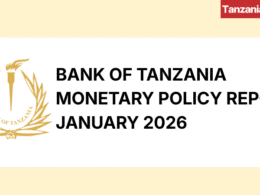The Monetary Policy Committee (MPC) of the Bank of Tanzania held its 226th Ordinary Meeting on 22nd May 2023, where it reviewed the performance and outlook of the domestic and global economy.
The committee expressed satisfaction with the sustained implementation of a less accommodative monetary policy, which has successfully contained inflation within the target while ensuring an adequate supply of liquidity in the banking system.
Global Economic Trends and Domestic Economy
The MPC noted that global economic activity remained weak in 2022, with an uncertain outlook due to the adverse effects of the war in Ukraine, monetary policy tightening, and climate-related constraints.
Despite these challenges, Tanzania’s domestic economy is on track, supported by improving business conditions, sustained public and private investment, recovery in tourism, and strong growth of credit to the private sector.
Inflation and Growth
Inflation in Mainland Tanzania eased for the third month in a row to 4.3% in April 2023, remaining below the target of 5.4% for 2022/23. In Zanzibar, inflation rose to 7.5% in April 2023, remaining above the medium-term target of 5%, largely due to an increase in the prices of food. The MPC expects inflation to remain low in the remainder of 2022/23, based on the expected further decline in food and energy prices in the global market.
Banking Sector and Monetary Policy
The banking sector remained stable and resilient to shocks, characterized by adequate capital, liquidity, and profitability. Given the domestic and global economic conditions, the MPC approved the Bank to sustain the implementation of a less accommodative monetary policy in May and June 2023. This policy stance will ensure that inflation remains within the target of 5.4% in the remainder of 2022/23, while supporting attainment of quantitative performance criteria under the IMF Extended Credit Facility (ECF) arrangement for the quarter ending June 2023.
Looking Ahead
The Bank of Tanzania will continue to closely monitor the developments in the economy and take additional actions, as deemed necessary, to address any unwarranted shocks. The MPC’s decision to maintain its less accommodative monetary policy stance reflects its commitment to ensuring economic stability amidst global uncertainties.











